

School Health has put together the below educational resources that can be shared with staff and parents about the infectious diseases prevalent in the news today.
10 Tips To Help Stop The Spread Of Infectious Deseases While Traveling
- Keep germs off your hands. Wash your hands as often as you can with soap and water or use an alcohol-based hand sanitizer that contains at least 60% alcohol. The TSA allows liquids in a clear container up to 3oz. for carry-on travel.
- Avoid (or disinfect) these common germ-infested areas. Consider germicidal wipes to clean surfaces in public spaces and restrooms before use. If traveling by air be sure to wipe your trays & armrests. Avoid anything placed in airplane seatback pockets and using any unwrapped glasses.
- Drink clean, fresh water. Traveling dehydrates you, making you more vulnerable to bugs and viruses while making it harder for your body to recover once it is infected. Alcohol and coffee aren’t optimal choices for hydration.
- Be choosy about what you eat. Eat healthy meals and snacks throughout your travel. This helps boost your immunity to protect yourself from illness. Also, try not to alter your diet completely while traveling, as that can cause an upset stomach. Finally, pick restaurants that are packed full of locals, which is a good indicator the food is fresh as well as delicious.
- Be on the lookout for people displaying signs of illness. See if you can move to an empty seat if you are seated next to a person who is obviously ill, or wear a face mask if those closest to you are showing signs of symptoms such as coughing or sneezing. Doing this will reduce your risk of contracting an airborne illness.
- Know when to contact your doctor. If you have any special needs, such as traveling with young children or you or someone is your party has a weakened immune system or is showing signs of being ill, contact your doctor prior to traveling for specific recommendations regarding your health.
- Schedule some time to rest. Prior to, during, and after traveling get plenty of rest. Getting 7-9 hours of sleep helps your body's immune system reboot itself and fight off infection. Don’t try and do too much in one day.
- Pack a travel health kit. It should contain your prescription medicines, over the counter medications (such as treatment for upset stomach), sunscreen, insect repellent, and first aid items. Visit the CDC's Pack Smart webpage http://wwwnc.cdc.gov/travel/page/pack-smart for specific recommendations.
- Research your destination for travel warnings & recommended vaccinations. Visit the CDC and World Health Organization's websites for country specific travel warnings if you are traveling internationally and also to find out if there are any specific vaccinations recommendations.
- Know what to do if you become sick on your trip. It is a good idea to call your insurance company before traveling to determine what options you have should you or members of your party get sick. Find hospitals and urgent care locations nearest your destination. Don't forget to pack your insurance cards. Taking a half an hour to understand how your insurance covers you while traveling could save you hundreds of dollars in medical bills should you need to get medical help while traveling.
Recommended Infection Control Products
Clorox 4-in-1 Disinfectant & Sanitizer
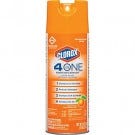

Disinfects hard surfaces with 24 EPA-registered kill claims, sanitizes soft surfaces and kills airborne odor-causing bacteria.
Sani-Cloth AF3 Germicidal Wipes
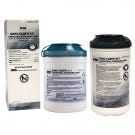

No harsh odors, so the product can be used around patients or staff with respiratory sensitivities. Bactericidal, Tuberculocidal, Virucidal.
Cavicide
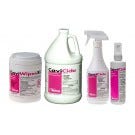

Disinfect inanimate surfaces including plastics, stainless steel, chrome, glass, plexiglass, hard rubber and painted surfaces. May also be used as a decontaminant soaking solution.
Germy Wormy Sleeves
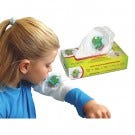

Germy Wormy is a fun, interactive target zone to help kids adopt the habit of cough/sneeze into your elbow/sleeve.
View All Pandemic Products
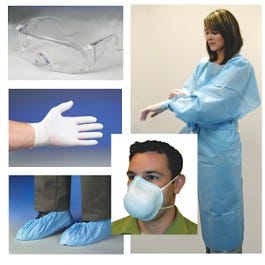

Masks, gloves, thermometers, shoe covers, barrier gowns, and more.